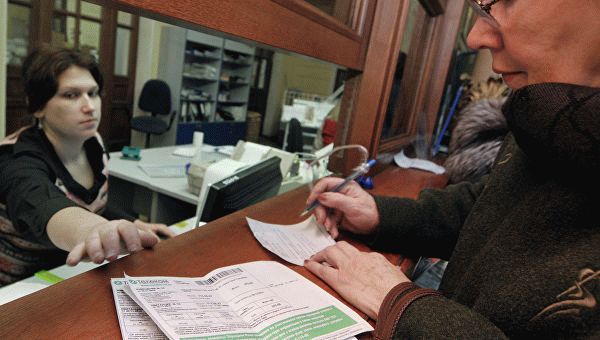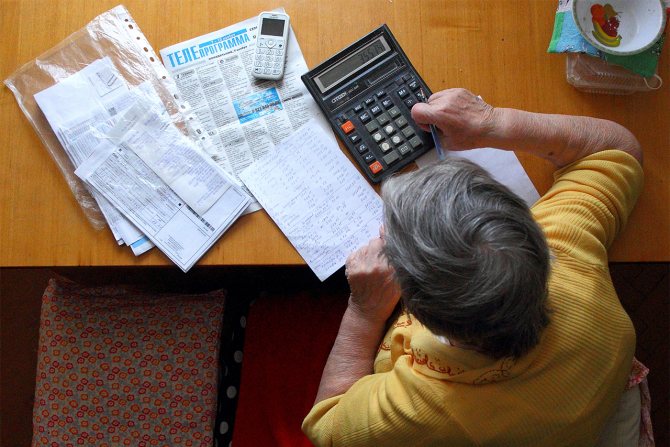DIRECTLY BETTER?
Apartment owners are not always satisfied with the role of management companies (MCs), homeowners' or real estate associations (HOA or TSN) as intermediaries between residents and resource supply organizations (RSO). Changes to the Housing Code of the Russian Federation (Law No. 59-FZ of April 3, 2020) regulated the possibility of concluding contracts directly with resource supply organizations, bypassing the management company, for the supply of heat and water, sewerage, electricity and gas supply, heating, as well as for export garbage with regional operators.
– Our HOA was closed with bankruptcy of 5 million rubles. with a heating debt,” recalls Odintsovo resident Olga Dyachenko. – The HOA claimed that the tenants did not pay. And we paid. So personally, I will happily pay directly and sleep peacefully.
Earlier, Podmoskovye Segodnya wrote about the situation in the Edelweiss-Comfort residential complex in Balashikha, where residents were forced to cook food over a fire because the chairman of TSN opened a crypto farm in the parking lot. All the residents' money went to pay for the energy consumption of powerful computers. Due to the huge debt, Mosenergosbyt JSC limited power supply for four hours three times a week.
Payment of utilities directly to the resource supplying organization 2020
Until recently, all residents of apartment buildings were required to pay “utilities” through an intermediary, which was the management company or the HOA. But due to changes in legislation, owners can now enter into relevant agreements directly with suppliers.
Dear readers! The article talks about typical ways to resolve legal issues, but each case is individual. If you want to find out how to solve your particular problem , contact a consultant:
APPLICATIONS AND CALLS ARE ACCEPTED 24/7 and 7 days a week.
It's fast and FREE !
According to housing legislation, all owners of residential (and non-residential) real estate are required to pay for electricity, gas, water, sewerage and other resources provided. Typically, all payments, as well as the transfer of funds, are undertaken by the management company. For many years this procedure remained unchanged.
So, the management company, based on residents’ meter readings, independently or with the help of a special center, carries out the necessary calculations. After this, each owner receives a Unified Payment Receipt.
The features of this document are as follows:
- The receipt indicates all services provided.
- The tenant can independently choose the amount transferred to each specific supplier.
However, due to changes in housing legislation, already in 2020, the owner of an apartment will be able to pay for utilities directly to resource supply organizations. But it is not necessary to transfer utility bills directly to the supplier, since this is not forced by the Government.
If residents are satisfied with the organization that maintains their home, there is no need to work with suppliers on their own.
Before paying housing and communal services directly to the supplier, it is necessary to clarify all the nuances of the procedure. Firstly, the law has already come into full force in 2020, so we can already talk about concluding agreements. Secondly, the payment procedure is fixed at the legislative level. Therefore, owners will have to comply with all the rules.
An agreement to pay the supplier directly can be concluded if the new payment model is approved at a general meeting of residents. The law allows apartment owners to initiate the procedure for concluding contracts independently.
The supplier may also offer to make payments without an intermediary, that is, without a management company. This is possible when the management company owes the resource supplying organization the amount established by law. The existence of a debt must be recorded by the court.
When drawing up an agreement with all residents, it will be considered concluded on the following grounds:
- If the decision was made at a general meeting of apartment owners.
- A month after the termination of the contract between the supplier and the management company. Moreover, if there is a debt, the supplier can cancel the agreement unilaterally only by sending a corresponding notification to the other party.
After this, the management company’s mediation in settlements and payments will be terminated. And next month, residents will receive payment slips with a different recipient indicated.
The draft law in question was developed back in 2017. And immediately a large number of both supporters and opponents of this innovation appeared. After all, we are talking about removing the management company and making payments directly with residents.
This means that ordinary citizens will be left alone with legal entities who can use their powers more freely.
The President of the Russian Federation signed draft law No. 59 back in April, so now all apartment owners can apply the new procedure in practice.
When it comes to changes in housing legislation, many citizens see only disadvantages in this. But if we talk about direct payments to utility providers, then everything is not so bad. There are many positives for ordinary consumers.
This innovation appeared as a result of the emergence of large arrears in payment of utility bills. Usually the situation develops according to one of two scenarios - either the residents pay and the management company pays, or vice versa, the owners transfer the money to the management company, but the latter does not transfer it to the supplier.
In both cases, not only the resource supplying organization suffers, but also the users. After all, sooner or later the management company becomes bankrupt, but the debts do not go away. With the disappearance of the intermediary, it will be easier for the parties to resolve such financial issues.
Another undoubted advantage is that management companies will be able to spend funds not on paying off debt, but on improving the apartment building and the territory. In addition, all residents will know that the funds go directly to the supplier and do not end up in the accounts of the management company.
However, the bill also has a number of shortcomings. First of all, this concerns the weak legal protection of residents, who are left alone with suppliers. Another problem is tariffs, as apartment owners are afraid that they will have to pay much more. Whether this is actually true, only time will tell.
Is there a statute of limitations for utility bills? See here.
Conflicts between residents and management companies very often arise due to unreasonable increases in tariffs. Moreover, the owners will not find out about this immediately, but after several months of paying at the new prices. That is why contracts with suppliers raise great doubts, because they too can make paying for housing and communal services unaffordable for ordinary citizens.
In practice, there is no reason to increase the cost of utilities. Just as the average price rose by 4% per year across the country, it will most likely continue to rise. Naturally, there can be no talk of reducing tariffs. Therefore, apartment owners can easily enter into contracts with resource supply organizations and pay as usual.
Debt in payment for utilities is always a problem not only for the management company, but for all residents. While the presence of an intermediary between the owner and the supplier is mandatory, it is the management companies that are trying to deal with debtors.
There are not many ways to carry out this procedure. The first step is to cut off resources, and if the tenant ignores these measures, the debt is collected through the courts. But since this procedure usually drags on for a long time, management companies pay suppliers out of their own pockets.
As soon as the new law comes into force, resource supply organizations will be involved in the fight against unscrupulous clients. As for the methods, they are standard:
- penalties (the amount may increase);
- use of a simplified procedure for debt collection through court;
- a ban on the creation of management companies or partnerships by the heads of such organizations that were previously declared bankrupt;
- use of a bank guarantee from companies involved in the maintenance of MKD in favor of the resource supplier.
How to pay housing and communal services without commission via the Internet? Information here.
How to submit an application to the Criminal Code for recalculation of utilities? Details in this article.
The introduction of new rules for paying for housing and communal services does not mean that all residents of apartment buildings must strictly comply with them.
This is only a recommendation and assistance to those owners who cannot find a reliable management company, and therefore are forced to constantly cover debts to suppliers. Such consumers first of all need to pay attention to the possibility of concluding direct contracts.
- Due to frequent changes in legislation, information sometimes becomes outdated faster than we can update it on the website.
- All cases are very individual and depend on many factors. Basic information does not guarantee a solution to your specific problems.
That's why FREE expert consultants work for you around the clock!
- via the form (below), or via online chat
- Call the hotline:
- Moscow and the Region
- St. Petersburg and region
- Regions
APPLICATIONS AND CALLS ARE ACCEPTED 24/7 and 7 days a week.
This is interesting: utilities in non-residential premises - Forum Housing and communal services calculations 2020
There are changes in the housing code: now you can pay for electricity, water, heating and gas to the organization that supplies these resources. If you conclude a contract directly, the money from the owners will go directly to the supplier, and not to the account of the management company or HOA.
To pay directly, you need to agree with your neighbors and make a decision at a general meeting. If everything works out, you will save money, reduce the risk of fraud on the part of the management company, and you will be able to get money from it.
It was impossible to conclude an agreement directly with the water, gas or electricity supplier. The management company issued invoices in which it itself indicated certain amounts, tariffs and standards. The owners transferred the entire amount to the account of the management company, and that to the resource suppliers.
The housing code had an option for direct payment, but not everyone could use it. In this case, there was still no agreement between the owner and the supplier: only payment could be direct. But now this point no longer works.
Most often, the house has a management company or HOA that issues receipts and accepts money.
Some management companies work honestly: they do not overcharge, transfer money on time and do not distort information. Then the owners do not overpay, and the house is not listed as a debtor to the conventional energy sales or water utility.
But there are dishonest management companies. They inflate readings, charge fees incorrectly, and do not transfer money from residents to resource providers on time. Sometimes such management companies even steal money and then go bankrupt or disappear. The house has debts, and the owners or the new management company have to deal with them.
Until now, residents have not been able to fully and quickly control payments. We had to trust the management company, but this is not always justified.
Now residents of an apartment building can enter into direct contracts with resource suppliers. Payments for utilities will not be issued to them by management companies, but by energy sales, interregional gas or water utilities - that is, those companies that supply light, heat and water to the house.
The management company will not receive money for services that it does not provide. But residents will not have this opportunity on their own. In order to conclude a direct agreement at the request of the owners, someone needs to do this.
You can pay directly for all utilities:
- Cold and hot water supply.
- Water disposal (i.e. sewerage).
- Heating of all types.
- Energy supply.
- Gas supply.
- Garbage removal.
You can conclude direct contracts for all types of services or only for waste removal and heating, in any combination.
To pay directly, you need to hold a general meeting of owners. The contract with the resource supplier is concluded with all owners at the same time. It won’t be the case that one apartment pays directly to the energy supply, and the other pays to the management company.
If the general meeting decides to pay directly, this decision must be sent to the resource supplier, for example the local water utility. Then the residents will receive payments from the water utility and transfer money to it too.
If the management company or homeowners association owes the resource supplier money for more than two months, the contract with them may be forcibly terminated. To do this, the supplier must sue the management company and win it.
Vodokanal or energy sales will send the owners a notice of termination of the contract with the management company and the conclusion of direct contracts. Residents do not need to enter into a written contract: the supplier’s refusal to work through the management company will be unilateral.
Notice of the transition to direct payment will be posted somewhere visible to residents, published on the website and printed in the official local newspaper.
One month after such notification, the contract with the management company is considered terminated. Residents are starting to pay directly. The management company will no longer be able to issue receipts for water, gas and electricity and demand money. And if she does this, she can be fined: the cunning management company will pay the owner twice as much as it showed on the receipt.
Even if you have a direct agreement with resource suppliers, you can still complain to the management company. By law, she is obliged to keep all systems in the house in order, even if the residents do not pay her for water and gas.
If the owner finds an error in the receipt or the hot water seems not hot enough, you can contact the management company. The management company cannot say: “Whoever you signed the contract with, go there,” - it is obliged to accept the appeal and respond. But the supplier, not the management company, will be responsible for the quality of services under a direct contract.
But the management company is responsible for communications in the house, even with direct contracts. If a pipe is leaking or there are problems with the electrical cable, you can demand that the management company fix everything. In this case, references to a direct contract with the service provider are useless.
By agreement with the supplier, the management company can limit his access to resources. An electrician from the power supply company, or maybe from the management company, can turn off the lights in the debtors’ apartment. They will agree on who will do it: the law allows it.
The management company makes money not from resources, but from maintaining the house and maintaining common property. She will not lose her money: the owners will pay her at the agreed rates for routine repairs, cleaning of entrances and other services that are included in the house management agreement.
Even after concluding direct contracts, you will still receive receipts from the management company and are required to pay for them. The resources you pay to suppliers simply won’t be listed there.
Hold a general meeting. Any owner can take the initiative. The meeting can be held in person or with absentee voting. To make a decision, a quorum is required - this is more than 50% of the total number of votes.
For a decision to switch to direct contracts to be made, a majority vote of all those present is sufficient.
Minutes of the meeting must be sent to the resource provider. Then they will explain to you what to do. There will be no need to sign a paper document with each owner: there will be a standard form for direct contracts.

Let us emphasize once again that unscrupulous companies will leave the market.
In such a situation, there are three possible ways:
1 - competitions that will be held by local administrations and appoint management companies to manage houses for a certain period until the residents choose a new management company themselves.
2 - CoES (Emergency Situations Commission) - an emergency commission that will appoint a temporary management company for the period of the competition.
3 - Owners, if they wish, can completely change the form of management of the house, say, to an HOA or TSN.
Presumably, after the start of the system of direct settlements with RSO, more than 30% of management companies will be forced to leave the market or become bankrupt, since all management companies at the time the law comes into force will have to agree with RSO on debt repayment schedules for consumed resources.
Currently, management companies are responsible for collecting debts for non-payment of utilities. And RSOs collect debts from the management company. This is quite easy to do. Now they are filing hundreds of lawsuits against the Criminal Code, and then they will file millions against the residents.
In the future, utility service providers will collect debts from residents. RSOs will collect debts for utilities, and management companies will collect debts at the rate for housing maintenance and repairs. As noted above, this is a huge plus for the management company. Management companies will not be responsible for the debts of residents, and the funds received from the owners will go to the right purposes.
This is interesting: The procedure for recalculating the amount of payment for utility services provided of inadequate quality in 2020
Experts doubt that residents' debts to RSO will decrease. However, there will not be such a rapid increase in debt.
Now 90% collection rate is an average figure. This is a good indicator. A critical indicator for collection rates is in the North Caucasus region - there only about 60-65% of the population pays bills for housing and communal services.
When switching to direct contracts, nothing will change for residents except the institution sending the payment. They received receipts for housing and communal services, and will continue to receive them. The payment order will contain details of only those suppliers who should receive money.
A significant advantage of the innovation is that residents will have confidence that the amount they paid will go to the supplier and will not end up in the pocket of an unscrupulous management company. This will avoid gray schemes.
The new law has one significant advantage: since management companies will not be liable for residents’ debts, the management company can use the funds received from the owners for improvement and maintenance of housing. That is, the management company, for example, will fix the pipe, and will not pay the debts of the RSO for the residents.
However, since the law is still new, there is no precise understanding on some issues, for example, on checking the correctness of the submitted testimony from residents. In this case, the RSO is a disinterested party in the process of verifying the correctness of the transmitted evidence. The amount of evidence the residents give them is the amount they will charge. No one will come to check. They don’t need this, because the delta will be paid by the management company. What the resource officers put up and what the counters showed, the management companies will have to pay the difference. That is, the management company will be forced to pay bills for those residents who provided false information about consumption.
In addition, a big question for the management company is how the splitting and distribution of money received from residents will take place among all recipients in the payment order and the transparency of this distribution between all participants in the process.
If there is no clear procedure for the distribution of funds from the owners, then as a result, residents may incur debts due to incomplete payment of utilities. Moreover, it is not yet clear how this debt will be distributed. For example, if a receipt was issued for 5 thousand rubles, but the owner paid only 4 thousand, then it is not clear that he did not pay for some service. Or the owner paid all 5 thousand rubles, and they were sent only to one resource supplier, to whom, for example, the population has accumulated the largest debt.
The document will exclude management organizations from the system of payments for utility services. And the fees paid by consumers will go directly to resource providers. Thus, only payments for residential premises will go to the accounts of management companies, the Ministry of Construction noted.
In each region, either a specialized settlement center will be created, or an existing one will be attracted, which will only deal with issuing invoices to residents. It will accumulate information from resource supply organizations and management companies and issue payments.
Currently, residents pay utility bills through payment centers.
Now the management company can either independently make payments to residents in full, or attract third-party cash settlement centers. Residents take readings from individual meters, submit them to the management company, and the management company, in turn, sends these readings to the settlement center.
In this case, resource supply organizations (RSOs) issue invoices to management companies for the entire volume of consumption by an apartment building and do not take part in any way in the distribution of the consumed volume of utilities between the owners. That is, at the end of the month, resource specialists look at how much heat, water and other resources the house consumed and issue an invoice to the management company, and the management company then distributes the consumption volumes among all owners.
Apartment owners and tenants will be able to pay for electricity, heat, water and gas, bypassing the management company. The government decided to adopt this law to reduce the debts of the population for consumed resources.
The debts of the population are growing very significantly. And the government understands that the percentage of underpayment of RSO by the management company is at least 10-15%. In the total market volume these are very significant amounts. Currently, the population's debt to the Russian Socialist Republic amounts to more than 1 trillion rubles.
It is planned that the law will come into effect on July 1, 2020. It is expected that from this date, RSOs will be able to transfer residents to direct payments if the debt of the management company for utilities exceeds two billing periods.
Also, owners who themselves made such a decision will be able to transfer payments directly, the Ministry of Construction and Housing and Communal Services of Russia clarified.
The concept of “provider of public services”, approved by the housing legislation of Russia, is constantly criticized by experts in the housing and communal services sector, and recently criticism of this concept has been heard from the lips of the deputies of the State Duma of the Russian Federation who directly approved it. The existing scheme for the provision and payment of utility services provides for the supply of a certain utility resource from the resource supplying organization to the provider of utility services (UO, HOA, housing cooperative), then this “utility resource” at a certain border of the zones of operational responsibility mysteriously turns into a “utility service”, which the contractor turns out to the consumer. Accordingly, payment for the service provided comes from the consumer to the provider, and from the provider (already as payment for a utility resource) to the RSO. The existing system of two different legal relationships (“RSO – executor of CG” and “executor of CG – consumer of CG”) does not always suit the participants in these legal relations.
What do RSO want?
Within the framework of the concept approved by law, the RSO supplies the utility provider with a utility resource and presents the cost of this resource for payment. At the same time, the contractor providing a utility service to the consumer is responsible for the quality of this service, records consumption volumes, makes recalculations, for which he accepts relevant documents from consumers, conducts claims work with debtors - and bears the corresponding costs for all this work. In this case, tariffs for utility services are equal to tariffs for the corresponding utility resources, i.e. RSO receives income in the form of the cost of the supplied resource, and does not incur costs associated with the provision of utility services. It would seem that this is a very good scheme for RSO - there is no need to work with each specific consumer, maintain appropriate accounting, or “extort” money from debtors.
But another problem arises. In the vast majority of cases, the provider of utility services cannot pay in full for the utility resource received from the RSO.
Firstly, the problem of non-payments by consumers of housing and communal services is more acute than ever. The reason is the low level of income of the population at the high cost of housing and communal services, and “protest” non-payments caused by both the low quality of services and the established public opinion about the general dishonesty of all utility providers.
Secondly (this is partly the consequences of the first reason), the CG contractor often uses the funds received for utility services for his own needs, to compensate for his own expenses, and to cover his own costs. It is necessary to take into account that non-paying consumers have debts not only for utilities, but also for housing, and the cost of housing services is the income of the CG contractor. At the same time, the cost of housing services is set by the consumers themselves, and in the overwhelming majority of cases the tariff is set at an amount that ensures the work of the contractor with minimal profitability, or even does not cover the contractor’s costs at all. Low tariffs and consumer debts lead to the need for the utility contractor to use for his own needs any funds in the organization’s current accounts, including funds intended to pay for utilities.
The current situation leads to the fact that RSOs are trying to find a work scheme in which the CG contractor works with end consumers, is responsible for the quality of services, conducts claims work, but at the same time, money from consumers goes directly to the RSO, bypassing “unreliable” settlement accounts of CG executors. And, it must be said, a number of such schemes are provided for by housing legislation.
This is interesting: New line in the payment slip - Forum Housing and communal services calculations 2020
Direct payments
If the general meeting of owners of apartment buildings has chosen a method of managing a management organization, or a HOA, or a housing cooperative or another specialized housing cooperative, and a specific organization has been elected to manage the house, such an organization becomes the executor of utility services. The contractor enters into management agreements with the owners of the building premises, providing, among other things, for the provision of utility services, and with the RSO enters into resource supply agreements for the purpose of providing utility services.
According to the management agreement, the utility service provider provides these same services and presents their cost to consumers for payment, i.e. receives funds to your current account.
However, parts 6.3 and 7.1 of Article 155 of the Housing Code of the Russian Federation establish that the general meeting of owners of apartment building premises (or the general meeting of members of the HOA, housing cooperative) may establish the possibility of making payments for utilities directly to the RSO. In this case, payment of utility fees by the owners directly to the RSO is considered the fulfillment of their obligations to pay for utility services. At the same time, no agreements are concluded between consumers and RSO, payment is made on the basis of a management agreement concluded between the utility contractor and consumers, the utility contractor continues to be responsible for the quality of utility services and is not relieved of the obligation to conduct claims work with debtors.
This is the first way to pay for utilities directly in RNO.
The second method is provided for by the Decree of the Government of the Russian Federation dated February 14, 2012. N124 (hereinafter referred to as Rules N124).
According to clause 26 of Rules N124, a resource supply agreement may provide for an assignment from the utility provider to the resource supplying organization of the right to claim consumer debt in accordance with Article 382 of the Civil Code of the Russian Federation.
In this case, no additional consent of the owners is required, no additional agreements are concluded between RSO and consumers, RSO issues invoices to the owners for payment of utility bills, handles claims with them regarding debts, etc. At the same time, the CG contractor continues to bear responsibility for the quality of services, but the resolution of issues of financial settlements for these services is transferred to the RSO.
In addition to the two above cases, in which there are no contractual relations between RSO and consumers, all payments are made by consumers of utility companies directly to RSO in the case of direct contracts for the provision of utility services between consumers and RSO.
However, you need to know that such direct contracts are not always legal.
Direct contracts
We will not describe for a long time the cases of the legality of concluding direct contracts between RSO and consumers of utilities, but we will simply provide an exhaustive list of such cases:
1. Conclusion of an agreement with the owner of an individual residential building.
2. Conclusion of agreements with the owners of MKD premises in the event of the election of direct management by the general meeting of owners.
3. Concluding agreements with the owners of apartment building premises in the event that the management agreements of the owners with the previously existing management contractor (UO, HOA, housing cooperative) are not valid (expired, terminated for one reason or another), and the management agreement with another management contractor is not concluded (the management method has not been selected or implemented, the organization managing the house has not been selected, or has been selected from a date that has not yet occurred, etc.).
4. Conclusion of agreements with owners of non-residential premises of apartment buildings.
5. Conclusion of agreements with the owners of apartment building premises in the event that the debt of the utility contractor to the RSO exceeded the cost of consumption of a utility resource for three months.
The legislation does not provide for other cases of concluding direct contracts for the provision of utilities between RSO and the consumer of utilities.
It is necessary to pay special attention that if there is a provider of utility services (UO, HOA, housing cooperative) and the absence of a three-month debt of this provider to the RSO, the conclusion of direct agreements between the RSO and the owners of residential premises of the apartment building is not based on the law. The presence of such an agreement indicates that one of the previously listed cases is taking place - either the contractor has a three-month debt (and the “conditions of the task” indicate that this is not the case!), or the owners of the premises have elected direct management (and we are considering the case of implementing the method management of the management company, HOA or housing cooperative). Such an agreement implies that the RSO has the duties of a executor of the CG, i.e. maintenance and repair of intra-house networks, ensuring the provision of appropriate utilities to premises owners. But, firstly, the RSOs themselves usually do not plan to perform such duties, and secondly, if there is a CG executor elected by the general meeting, his functions cannot be transferred to the RSO. Thus, in the case under consideration, the direct agreement between the RSO and the owners of the residential premises of the apartment building is void, and any court will recognize this.
Let us summarize our reasoning.
Direct payments by owners of premises in the North Ossetia region are possible:
1. From the owners of residential buildings, on the basis of an agreement with RSO. Grounds: part 9 of article 155 of the Housing Code of the Russian Federation, sub. “c” clause 17 of the Rules for the provision of utility services, approved by the RF Government of 05/06/2011 N354 (hereinafter referred to as Rules N354).
2. From the owners of non-residential premises of MKD. Reason: clause 18 of Rules N354.
3. From the owners of residential premises in MKD in the following cases:
3.1. With direct control of the MKD. In this case, the RSO is the executor of the utilities, and agreements for the provision of utility services are concluded between the RSO and the owners. Grounds: part 8 of article 155 of the Housing Code of the Russian Federation, subp. “a” clause 17 of Rules N354.
3.2. When managing a house of a management company, HOA, housing cooperative, if the general meeting of owners of the apartment building premises has made an appropriate decision. There is no agreement between the RSO and the owners; changes may be made to the management agreement. Grounds: parts 6.3 and 7.1 of Article 155 of the Housing Code of the Russian Federation.
3.3. When assigning the right of claim from the contractor to the RSO. Corresponding changes are made to the resource supply agreement concluded between the RSO and the utility provider; consumer consent is not required; no agreements are concluded between the RSO and the owners of the premises. Grounds: clause 26 of Rules N124, Article 382 of the Civil Code of the Russian Federation.
3.4. If the management agreements of the owners with the previously existing executor of the CG (UO, HOA, housing cooperative) are not valid (expired, terminated for one reason or another), and the management agreement with another executor of the GC has not been concluded (the management method has not been selected or implemented, not the organization that manages the house has been selected, or has been selected from a date that has not yet occurred, etc.). Basis: sub. “b” clause 17 of Rules N354.
3.5. If the debt of the utility contractor to the RSO exceeded the cost of consumption of a utility resource for three months. Basis: sub. “a” clause 30 of Rules N124.
The current legislation of the Russian Federation does not provide for other cases of direct payments by owners of apartment building premises in the North Ossetia and the conclusion of direct contracts.
The AKATO Distance Learning Center offers applicants for a qualification certificate (officials of license applicants responsible for managing MKD) to undergo pre-certification training, during which all approved questions of the qualification exam will be explained in detail by an expert, indicating the correct answers and references to the provisions of the law regulating the issues under consideration. More details > > >
You can get clarification on current housing and communal services issues by taking part in seminars of the AKATO Center for Distribution Services. Follow the schedule of events on the AKATO website. ___________________________________________________________________
»
Payments
Accidents on public life support systems 2020
Read more
Payments
Incorrect housing and communal services charges for utilities: what to do? 2020
Read more
Great article 0
WHAT ARE WE AFRAID OF?

However, many homeowners are afraid to take advantage of the opportunity that has opened up to them, which they share on social networks. Some are afraid that they will get confused in payment bills, which will become several instead of one if they conclude separate agreements with each RSO.
Some people do not trust the payment agent MosObleIRTs in the payment system, when the management company issues payments to homeowners only for the maintenance of the housing stock, and direct bills for electricity, water supply, sewerage, heat, major repairs and garbage removal are included in the receipts of the information and settlement center MosOblEIRTS.
“Money received from payers is not accumulated in the accounts of MosOblEIRTS LLC, but is immediately “split” among utility providers, bypassing the accounts of the management company, which eliminates misuse,” explains MosOblEIRTS representative Olga Razumovskaya.
According to resident Andrei Yangabyshev, direct payments have other pitfalls. If, for example, it is cold in the apartment, you will have to run around to find out who is to blame. However, as our correspondent was confirmed by the regional Ministry of Housing and Public Utilities, organizations supplying utility resources are responsible for supplying resources of appropriate quality to the boundaries of the common property in the apartment building and the boundaries of the external networks of engineering and technical support for a given house. Everything that starts from the basement of the house is on the conscience of the management company or the HOA.









